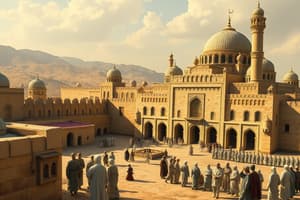Podcast
Questions and Answers
In a leased house, who retains ownership of the physical structure of the house?
In a leased house, who retains ownership of the physical structure of the house?
- The owner (correct)
- The property manager
- The usufructuary
- The lessee
What does usufruct ownership allow the lessee to do?
What does usufruct ownership allow the lessee to do?
- Benefit from the asset without owning it (correct)
- Sell the physical structure of the house
- Transfer ownership of the house to a third party
- Make permanent changes to the property
What is the primary distinction between ownership and usufruct?
What is the primary distinction between ownership and usufruct?
- Ownership includes only the physical asset (correct)
- Usufruct refers solely to financial interests
- Usufruct applies to both the asset and its benefits
- Ownership grants control without benefits
Who benefits from the usufruct in a leasing agreement?
Who benefits from the usufruct in a leasing agreement?
Which statement about ownership over usufruct is true?
Which statement about ownership over usufruct is true?
What action can the state take when ownership rights are abused?
What action can the state take when ownership rights are abused?
What may the government impose regarding property development?
What may the government impose regarding property development?
Which of the following best describes 'abuse of ownership'?
Which of the following best describes 'abuse of ownership'?
What might be a consequence of abusing ownership rights?
What might be a consequence of abusing ownership rights?
Which statement is false regarding state intervention in ownership?
Which statement is false regarding state intervention in ownership?
What is the primary reason for the restrictions on acquiring ownership rights over public properties?
What is the primary reason for the restrictions on acquiring ownership rights over public properties?
Which statement best reflects the nature of ownership rights concerning public properties?
Which statement best reflects the nature of ownership rights concerning public properties?
What would be a consequence of allowing private ownership of public properties?
What would be a consequence of allowing private ownership of public properties?
Which scenario exemplifies a violation of restriction on public property ownership?
Which scenario exemplifies a violation of restriction on public property ownership?
Why is it essential to maintain restrictions on public property ownership?
Why is it essential to maintain restrictions on public property ownership?
Which of the following properties cannot be owned by individuals?
Which of the following properties cannot be owned by individuals?
What is an example of a property that belongs to all mankind?
What is an example of a property that belongs to all mankind?
Which resource is stated as belonging to all of humanity?
Which resource is stated as belonging to all of humanity?
Why can't certain properties be owned by individuals?
Why can't certain properties be owned by individuals?
What does the content suggest about space as a property?
What does the content suggest about space as a property?
What is the suggested role of the state regarding resources?
What is the suggested role of the state regarding resources?
Why should the state manage resources?
Why should the state manage resources?
Which of the following statements is most aligned with the content?
Which of the following statements is most aligned with the content?
What is NOT a recommended method of resource management according to the content?
What is NOT a recommended method of resource management according to the content?
Which of these roles is implied for the state in managing resources?
Which of these roles is implied for the state in managing resources?
Which statement accurately reflects the nature of ownership rights?
Which statement accurately reflects the nature of ownership rights?
What can best be inferred about property ownership based on the given content?
What can best be inferred about property ownership based on the given content?
Which of the following is true regarding ownership rights?
Which of the following is true regarding ownership rights?
How are restrictions on ownership rights best characterized?
How are restrictions on ownership rights best characterized?
Which of the following best describes the relationship between ownership rights and law?
Which of the following best describes the relationship between ownership rights and law?
Flashcards
Ownership vs. Usufruct
Ownership vs. Usufruct
The owner of a house owns the building itself, while the lessee (renter) owns the right to use the house. For example, this applies to a leased house.
Usufruct
Usufruct
The right to use and enjoy the benefits of an asset. The owner of the asset still owns the asset.
Ownership
Ownership
Property ownership allows you to control and profit from an asset. For example, the owner of a house can sell it or rent it out.
Split Ownership (Usufruct)
Split Ownership (Usufruct)
Signup and view all the flashcards
Lease
Lease
Signup and view all the flashcards
Restrictions on Ownership Rights
Restrictions on Ownership Rights
Signup and view all the flashcards
Conditions on Property Ownership
Conditions on Property Ownership
Signup and view all the flashcards
Legal Constraints on Property Rights
Legal Constraints on Property Rights
Signup and view all the flashcards
Government Restrictions
Government Restrictions
Signup and view all the flashcards
Relative Nature of Ownership
Relative Nature of Ownership
Signup and view all the flashcards
Public Properties and Ownership
Public Properties and Ownership
Signup and view all the flashcards
Restrictions on Ownership
Restrictions on Ownership
Signup and view all the flashcards
Public Benefit
Public Benefit
Signup and view all the flashcards
Acquiring Ownership of Public Property
Acquiring Ownership of Public Property
Signup and view all the flashcards
Purpose of Public Properties
Purpose of Public Properties
Signup and view all the flashcards
Abuse of Ownership Limits
Abuse of Ownership Limits
Signup and view all the flashcards
Development Restrictions
Development Restrictions
Signup and view all the flashcards
Limited Property Rights
Limited Property Rights
Signup and view all the flashcards
State Regulation of Ownership
State Regulation of Ownership
Signup and view all the flashcards
Public Benefit Restrictions
Public Benefit Restrictions
Signup and view all the flashcards
Commonly Owned Resources
Commonly Owned Resources
Signup and view all the flashcards
Collective Ownership
Collective Ownership
Signup and view all the flashcards
Global Commons
Global Commons
Signup and view all the flashcards
Inalienable Rights
Inalienable Rights
Signup and view all the flashcards
Essential Resources
Essential Resources
Signup and view all the flashcards
Property Ownership
Property Ownership
Signup and view all the flashcards
State-Managed Resources
State-Managed Resources
Signup and view all the flashcards
Government Restrictions on Property Rights
Government Restrictions on Property Rights
Signup and view all the flashcards
Study Notes
Islamic Theory of Ownership
- Allah (swt) holds ultimate ownership of all creation.
- Quranic verses support God's ownership over all creation. (e.g., 12:6)
- Ownership is part of human nature.
- Islam upholds individual's right to private property.
- Quranic phrases ("his wealth", "their wealth", etc.) signify individual ownership.
Restrictions on Ownership
- Ownership is not absolute; it's subject to restrictions and regulations.
- A Muslim holds property in trust, accountable to Allah (swt).
- Private ownership excludes others and grants the owner authority.
- The owner may use the property itself or its usufruct.
Acquisition of Ownership
- Ownership can be acquired through various contracts (e.g., sale, gift, donation, will, partnership).
- Inheritance is another way to acquire ownership of property.
- Ownership of natural resources, such as land, can be acquired through first possession and labor (e.g., hunting, exploiting, and working the land).
Divisions of Private Ownership
- Private ownership is divided into complete and incomplete ownership.
- Complete ownership grants full rights over a specific property, including its usufruct (enjoyment/use).
- Incomplete ownership has subsets:
- Ownership over the rights connected with a land.
- Ownership of the property itself
- Ownership of the usufruct of property.
Ownership Rights Included in Land
- Rights over water, irrigation, and passage are intrinsically linked to ownership of the land.
- These indivisible rights cannot be traded separately.
Ownership Over a Property
- Property ownership signifies sole possession and use of a certain property.
- Usufruct is another legal concept, often in a lessee situation.
Ownership Over Usufruct
- Usufruct involves the benefits gained from an asset, while the owner retains ownership.
- It can be obtained through borrowing, leasing, endowment, will, etc.
- The lessee has the right to use the asset for a certain time.
Characteristics of Ownership Over Usufruct
- Ownership over usufruct is restricted by conditions of time, place, and rules.
- The beneficial owner is typically not liable for maintenance in contracts associated with usufruct.
- The borrower is responsible for maintenance if the ownership over usufruct is through a loan.
Restrictions on Ownership Rights
- Public properties cannot be privately owned since their aim is to benefit the public.
- Ownership of prohibited items (e.g., wine, pigs) is disallowed.
- Acquisition of ownership should be lawful and avoid practices like usury, gambling.
Restrictions Related to Utilization
- Muslims are commanded to spend wealth for Allah's sake and assist relatives and the poor.
- Wastefulness is prohibited.
- Investment for economic growth and job creation is considered virtuous.
- Exercise of property rights must not infringe on the rights of others (e.g., light and air).
Abuse of Ownership
- If the right to own property is abused, the state may regulate or restrict it.
- Development and construction in certain areas might be subjected to regulations.
- Non-use of land may invite state intervention.
- Uncultivated land may be taken and allocated for cultivation.
Ineligible Assets For Individual Ownership
- The atmosphere, free air, sun's rays, ocean resources, and space cannot be owned by individuals.
- These globally essential resources are for all humankind.
- The Prophet (PBUH) declared that grass, water, and fire are shared resources.
State Supervision of Natural Resources
- Vital resources (e.g., forests, rivers, minerals) are managed by the state or through authorized private entities.
- State supervision will ensure these are utilized ethically for the common good.
- Corporations are restricted to specific logging activities within a particular area for a specific time.
Studying That Suits You
Use AI to generate personalized quizzes and flashcards to suit your learning preferences.




